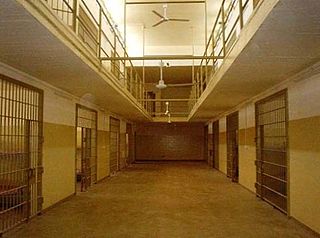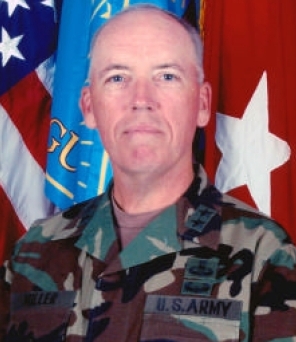
Abu Ghraib prison was a prison complex in Abu Ghraib, Iraq, located 32 kilometers (20 mi) west of Baghdad. Abu Ghraib prison was opened in the 1960s and served as a maximum-security prison. From the 1970s, the prison was used by Saddam Hussein to hold political prisoners and later the United States to hold Iraqi prisoners. It developed a reputation for torture and extrajudicial killing, and was closed in 2014.

Lynndie Rana England is a former United States Army Reserve soldier who was prosecuted for mistreating detainees during the Abu Ghraib torture and prisoner abuse that occurred at the Abu Ghraib prison in Baghdad during the Iraq War. She was one of 11 military personnel from the 372nd Military Police Company who were convicted in 2005 for war crimes. After being sentenced to three years in prison and a dishonorable discharge, England was incarcerated from September 27, 2005, to March 1, 2007, when she was released on parole.

Charles A. Graner Jr. is an American former soldier and corrections officer who was court-martialed for prisoner abuse after the 2003–2004 Abu Ghraib prisoner abuse scandal. Along with other soldiers of his Army Reserve unit, the 372nd Military Police Company, Graner was accused of allowing and inflicting sexual, physical, and psychological abuse on Iraqi detainees in Abu Ghraib prison, a notorious prison in Baghdad during the United States' occupation of Iraq.

Sabrina D. Harman is an American former soldier who was court-martialed by the United States Army for prisoner abuse after the 2003–2004 Abu Ghraib prisoner abuse scandal. Along with other soldiers of her Army Reserve unit, the 372nd Military Police Company, she was accused of allowing and inflicting physical and psychological abuse on Iraqi detainees in Abu Ghraib prison, a notorious prison in Baghdad during the United States' occupation of Iraq.

Jeremy Charles Sivits was a United States Army reservist. He was one of several soldiers charged and convicted by the U.S. Army in connection with the 2003–2004 Abu Ghraib prisoner abuse scandal in Baghdad, Iraq, during and after the 2003 invasion of Iraq. Sivits was a member of the 372nd Military Police Company during this time.
Megan Ambuhl is a former United States Army Reserve soldier who was convicted of dereliction of duty for her role in the prisoner abuse that occurred at Abu Ghraib prison, a notorious prison in Baghdad during the United States' occupation of Iraq.

Ivan "Chip" Frederick II is an American former soldier who was court-martialed for prisoner abuse after the 2003–2004 Abu Ghraib prisoner abuse scandal. Along with other soldiers of his Army Reserve unit, the 372nd Military Police Company, Frederick was accused of allowing and inflicting sexual, physical, and psychological abuse on Iraqi detainees in Abu Ghraib prison, a notorious prison in Baghdad during the United States' occupation of Iraq. In May 2004, Frederick pleaded guilty to conspiracy, dereliction of duty, maltreatment of detainees, assault, and indecent acts. He was sentenced to 8 years' confinement and loss of rank and pay, and he received a dishonorable discharge. He was released on parole in October 2007, after spending four years in prison.

During the early stages of the Iraq War, members of the United States Army and the Central Intelligence Agency committed a series of human rights violations and war crimes against detainees in the Abu Ghraib prison in Iraq. These abuses included physical abuse, sexual humiliation, physical and psychological torture, and rape, as well as the killing of Manadel al-Jamadi and the desecration of his body. The abuses came to public attention with the publication of photographs by CBS News in April 2004, causing shock and outrage and receiving widespread condemnation within the United States and internationally.
About six months after the United States invasion of Iraq of 2003, rumors of Iraq prison abuse scandals started to emerge.

Geoffrey D. Miller is a retired United States Army major general who commanded the US detention facilities at Guantanamo Bay, Cuba, and Iraq. Detention facilities in Iraq under his command included Abu Ghraib prison, Camp Cropper, and Camp Bucca. He is noted for having trained soldiers in using torture, or "enhanced interrogation techniques" in US euphemism, and for carrying out the "First Special Interrogation Plan," signed by the Secretary of Defense, against a Guantanamo detainee.
Mullah Habibullah was an Afghan who died on December 4, 2002 while in US custody at the Bagram Collection Point, a US military detention center in Afghanistan. His death was one of those classed as a homicide, though the initial military statement described his death as due to natural causes.

In 2005, The New York Times obtained a 2,000-page United States Army investigatory report concerning the homicides of two unarmed civilian Afghan prisoners by U.S. military personnel in December 2002 at the Bagram Theater Internment Facility in Bagram, Afghanistan, and general treatment of prisoners. The two prisoners, Habibullah and Dilawar, were repeatedly chained to the ceiling and beaten, resulting in their deaths. Military coroners ruled that both the prisoners' deaths were homicides. Autopsies revealed severe trauma to both prisoners' legs, describing the trauma as comparable to being run over by a bus. Seven soldiers were charged in 2005.

Dilawar, also known as Dilawar of Yakubi, was an Afghan farmer and taxi driver who was tortured to death by US Army soldiers at the Bagram Collection Point, a US military detention center in Afghanistan.
United States Army Captain Carolyn Wood is a military intelligence officer who served in both Afghanistan and Iraq. She was implicated by the Fay Report to have "failed" in several aspects of her command regarding her oversight of interrogators at Abu Ghraib. She was alleged by Amnesty International to be centrally involved in the 2003 Abu Ghraib and 2002 Bagram prisoner abuse cases. Wood is featured in the 2008 Academy award-winning documentary Taxi to the Dark Side.

Abdul Wali was an Afghan farmer who died in United States custody on June 21, 2003, at the age of 28. At the time of his death, he had been held for three days at the US base 10 miles (16 km) south of Asadabad, in Kunar Province, Afghanistan, on suspicion of involvement in a rocket attack on the same base, after voluntarily handing himself in. The local governor, Said Akbar, had told Wali to turn himself in so he could clear his name.
Damien M. Corsetti was a soldier in the United States Army. As part of the Army's investigation into prisoner abuse at Bagram, Corsetti was charged with dereliction of duty, maltreatment, assault and performing an indecent act with another person. PFC Corsetti was later found not guilty of all charges. At the time Corsetti was a specialist in the 519th Military Intelligence Battalion, serving under Lieutenant Carolyn Wood.
Steven L. Jordan is a former United States Army Reserve officer. Jordan volunteered to return to active duty to support the war in Iraq, and as a civil affairs officer with a background in military intelligence, was made the director of the Joint Interrogation Debriefing Center at Abu Ghraib prison.
Joshua R. Claus is a former member of the United States Army, whose unit was present at both Iraq's Abu Ghraib and at the Bagram Theater Detention Facility in Afghanistan, and was the first interrogator of Guantanamo detainee Omar Khadr. In 2005, he was found guilty of maltreatment and assault against an Afghanistan detainee who later died.
The United States Armed Forces and its members have violated the law of war after the signing of the Hague Conventions of 1899 and 1907 and the signing of the Geneva Conventions. The United States prosecutes offenders through the War Crimes Act of 1996 as well as through articles in the Uniform Code of Military Justice. The United States signed the 1999 Rome Statute but it never ratified the treaty, taking the position that the International Criminal Court (ICC) lacks fundamental checks and balances. The American Service-Members' Protection Act of 2002 further limited US involvement with the ICC. The ICC reserves the right of states to prosecute war crimes, and the ICC can only proceed with prosecution of crimes when states do not have willingness or effective and reliable processes to investigate for themselves. The United States says that it has investigated many of the accusations alleged by the ICC prosecutors as having occurred in Afghanistan, and thus does not accept ICC jurisdiction over its nationals.
A number of incidents stemming from the September 11 attacks have raised questions about legality.











